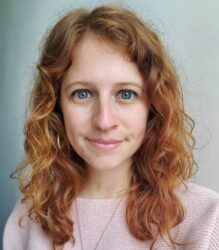
Allison Wilkerson
I am a 29-year old woman from the United States, and I am currently pursuing a Master of Science (MSc) in Environment and Development at the University of Edinburgh. Before coming to school, I worked as an officer in the United States Air Force, and to be frank I struggled with my military service. I genuinely love people. I consider myself to be a compassionate person (although oftentimes more compassionate with others than with myself). I enjoy connecting with the world, meeting new people, experiencing new cultures, and I felt fundamentally out of place in an organization whose purpose is to provide lethal force in pursuit of national security objectives that I did not always agree with, executed through concepts and techniques that I also did not always agree with.
My time in school has been a blessing. I have been surrounded by an incredible international cohort of classmates that shares similar values, and I have been challenged by peers to seek new perspectives on difficult topics. In the first semester of classes, my colleagues and program director had many conversations on the ethics around completing a project in Nepal. We discussed the sustainability of flying, concerns around completing projects in a short timeframe, how to appropriately collaborate with the Southasia Institute of Advanced Studies (SIAS), and we expressed the importance that our projects tied into ongoing SIAS work.
When the COVID-19 global health pandemic started, my classmates and I were devastated that our fieldwork trip to Nepal was cancelled. Personally, I am incredibly sad that we were unable to work with SIAS in person. First, I felt disconnected from the place being discussed. For me, to know a place is an experience of the entire body, not solely of the mind. When working from a distance we are completely removed from the sounds and the smells and the tastes of a place. We are removed from the culture. But I also felt disconnected from people – both our counterparts at SIAS and my own classmates. Working remotely, we miss all of the in-between moments and the genuine emotional connections that are built when hearing someone discuss their passion or while waiting for a meeting to start. When the trip was cancelled, the city of Edinburgh had not yet gone into lockdown, and we had only a few more classes before everything shifted online. Those final classes were the last time I saw some of my classmates in person.
Despite the challenges of working from abroad, the University staff worked with the researchers at SIAS to provide an incredible learning experience centred around some of Nepal’s environment and development challenges. In the first week experts at SIAS gave online lectures addressing five main challenge areas: protected areas and livelihoods; rural risk, livelihoods, and resilience; gender equality and social inclusion; water practices and governance; and disaster and urban resilience. Within each presentation, they made sure to frame those challenges within their respective temporal and spatial contexts. Then in the second week, we split into four groups to work on research projects led by a SIAS counterpart.
My group was led by Rachana Upadhyaya and focused on disaster and risk reduction, and we navigated the complexities of when developmental projects have the potential to displace local residents. One of my main takeaways from the first week, which I also experienced during my time in the military, is that around the world, there is a lack of positive female role models and leaders. This is not to say that great female leaders do not exist, but rather global challenges of gender dynamics make it difficult for female leaders to rise. I am incredibly grateful that I had the opportunity to work with a strong female leader from another country. In a single sentence, Rachana provided some of the best research advice I’ve received during my time in school: the results may not be neutral, but the questions should be. It is difficult to be neutral in a field for which you have passion. It is difficult to be neutral when you witness hardship in communities. And understanding that every person presents research from a complex, intersectional viewpoint, sometimes you simply have to acknowledge that your position is not neutral. As I navigate difficult conversations on race, culture, politics, religion, and ethics with my family and friends during this difficult time back home, the ability to ask hard questions while being open to receiving difficult answers is proving so important.
I am writing this ten days after the murder of George Floyd in the United States, and people across my home country are rising up to fight racial injustice and systemic oppression. In the wake of a global health pandemic that forced us to alter how we work and interact, we have developed necessary tools for global communication of pressing issues. These tools enable us to harness international support and collaboration. To attend online forums and meetings hosted by organisations worldwide that broaden your perspective on social injustices. To fight systemic oppression from wherever we are on the globe. For me, the work that we conducted with SIAS was pivotal in the development of my toolkit to tackle issues from afar, and I am grateful that I can now utilize those to engage in topics that I am passionate about.
“Views expressed here are personal and not associated with any affiliated organisations”
Published on 2020/06/16

